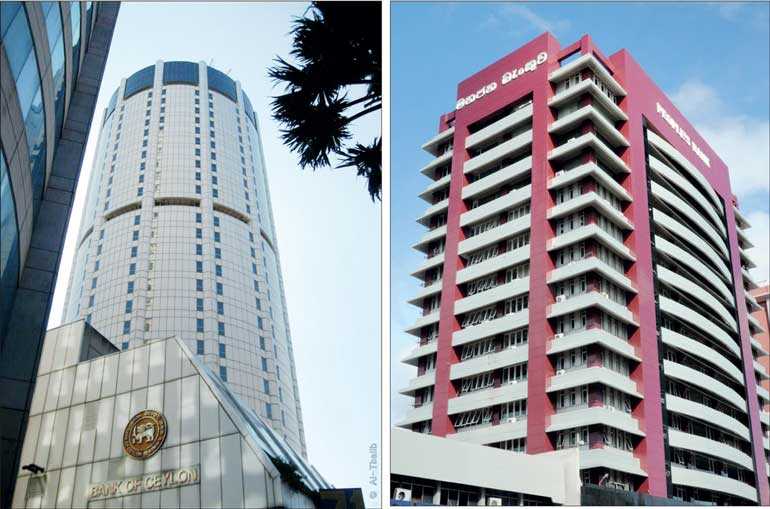Wednesday Feb 18, 2026
Wednesday Feb 18, 2026
Thursday, 12 March 2020 00:00 - - {{hitsCtrl.values.hits}}

Recent news surrounding the controversial removal and appointment of General Managers in BOC and PB has caused much concerns in the banking circles. Trade Union retorts that followed the media  disclosure about the Government decision portrayed a melodramatic series of events marking a departure from the highly responsible and affable CBEU union culture that prevailed throughout in the banking industry historically. Times have no doubt changed, so the old values.
disclosure about the Government decision portrayed a melodramatic series of events marking a departure from the highly responsible and affable CBEU union culture that prevailed throughout in the banking industry historically. Times have no doubt changed, so the old values.
Nevertheless, society needs to be reminded of the relevant reminiscences which reflect the underlying spirit associated with Trade Union actions in the past and to show how the uncompromising attitudes of the then leaders relentlessly contributed to stand out as unflinching fighters for the cause of principles and ideologies.
CBEU stood out as a colossal giant against movements that existed succumbed to the influence of bureaucrats. Short spells of party politics overriding the affairs of the union in usurpation of the broad interest of the membership have been successfully defeated.
They were able to mobilise the union strength to pitilessly defeat various opportunisms propagated by both left and right winged powers that were. The purity with which they launched such struggles did not leave room for anyone to dispute or renounce them because of the highly democratic approach with a persistent and patient line of action they adhered to in educating the membership about the involved issues.
Regretfully, the CBEU’s role in this instance appears to have been hasty, premature, prejudiced and remotely influenced. Their pronouncements to resort to indefinite strike action against the decision of the Government to replace the GMs of the two banks sounded more hilarious with no seriousness of a noteworthy warning!
There was no factual or analytical opposition that they could establish and demonstrate to justify their stand. Any Trade Union action that affects the society at large, covering a wide spread membership in one industry, cannot be sporadically promulgated in isolation of all other related issues. Perhaps a reasonable discussion of the various concerns and matters in the public domain about the affairs that prevailed in the State banks could have led to a more sensible approach to the subject.
To make a long story short, the recent Parliamentary COPE investigation into the glaring lapses and shortcomings in the management of the PB, revealed by Government audit reports would suffice. The public exposure of these proceedings bear ample evidence of the extremely unsatisfactory administration that existed there tainted with highly irregular and corrupt practices.
The cost to the Government coffers as a result of these abuses and in competencies was very high. Delinquencies highlighted by the Auditor General and examined by the CoPE exposed misconduct, misuse, corruption and exploitation on the part of those responsible and accountable for execution of authority in the bank. There was no hue and cry from the Trade Unions about those exposures. What a pity!
The reports we hear about BOC is no better. We heard about the highly unethical and unprecedented role play of the BOC in the 2015 CBSL Bond Scam by openly associating with the alleged culprits who are now before the law.
They provided facilitation of Rs. 15 billion within a matter of minutes to support the Perpetual Treasuries sordid operation. Foreign currency frauds through IT manoeuvres running into several hundreds of millions ($ 875,000) were recently challenged in courts against the bank and was ordered to reimburse in full with legal interest and costs.
Both PB and BOC played the cat’s paw role under the directions of the then Minister of Finance by agreeing to stay away from competitive bidding with other Primary Dealers in the alleged Bond Scam of March 2016.
These are matters for concern of all about the performance, administration and proper functions under regulatory provisions in respect of the banks. CBEU has a long history of hard struggles (not mere roadshows) against injustices of the bank managements in instances of violations of principals and natural justice.
A strike action at the Hong Kong Shanghai Bank branch of the Union launched on 3 August 1965 continued for one month and 18 days against a highly unprincipled policy introduced by the bank making it a precondition to leave the union membership to become eligible for promotion to officer grades. A member of the Union by the name O.C. De Crestor was to be victimised under this. The management agreed to withdraw their condition.
Thereafter, CBEU launched a general strike of the entire membership on 5 July 1969, against an arbitrary denial of a promotion to two members overlooking their seniority above those promoted. This strike went on for 18 days until the Minister of Labour appointed the L.B. De Silva Commission to lay down the principles applicable to promotion procedures.
On 26 November 1976, CBEU went on an islandwide one-day General Strike along with several other progressive trade unions and Students Movements in protest against the brutal killing of a student at the Peradeniya University, named Weerasooriya.
It is significant to note that the governing bodies of the Union has taken all these decisions after a full consultation of the membership. At times for example, during the Weerasooriya incident Union summoned a special emergency general membership meeting prior to the strike decision.
The State banks too have since of late adopted a laissez-faire attitude. Several revelations of abuse of power, corruption and questionable performance publicly highlighted have been callously disregarded. Good human resource management practices which include succession planning have been ignored.
Favoured promotions, recruitments to higher grades on contract basis with extremely high remunerations and perks have become the order in the operations. The Boards of Directors have come under heavy public and audit queries pointing and alleging incompetence.
What does this lead to? There is an Act of Parliament governing certain relevant aspects. Section 32 of the PB Act states as follows;
32 (1): There shall be a General Manager of the bank who shall be the bank’s Chief Executive Officer and who shall conduct the business of the bank under the general supervision and control of the Board
32 (2): The Board may delegate any of its powers or duties to any officer of the bank and may revoke any such delegation either wholly or in part and either as to persons or purposes
Government is the sole shareholder of both State banks. Treasury is responsible for the Public Funds and the Minister of Finance under whose purview the banks come has the right to give directives from time to time with regard to the role to be played by the banks in the implementation of Government policy decisions involving their participation.
The Treasury as the Golden shareholder has to intervene in the affairs of the banks in situations warranting such actions. Especially when the Boards and Chairmen have been found to be wanting and culpable, the treasury has to, in the Public interest imperatively exercise this right. This aspect has to be admitted by all concerned. Because that is where the crowning blow and the finishing touch should arrive from.
But there is a fishy and slippery element associated with the move taken by the Government in removing the two General Managers. One Minister of the Government went public to state that it was due to the failure of the banks to implement the recent decision of the government to grant a moratorium to the defaulting borrowers.
Some other quarters spelled out different reasoning attributing mala fides to the selection procedures of the GMs. Whatever the underlying factors are the government has a duty to explain in the public interest what exactly has transpired. If these appointments are covered and governed by valid service contracts a termination has to be in keeping with such provisions.
In the 1970s when BOC GM Sirimanne and the only DGM of BOC at that time Moheed were arbitrarily discontinued, while K. Shinya was the Chairman and Dr. N.M. Perera was the Minister of Finance, they went to courts against the decision and restored their positions legally. They had valid contracts of employment which could not be terminated at the whims and fancies of politicians.
There is one undeniable truth in this entire domain of activity. A serious lack of a conscious concern and control is apparent. Things have been allowed to move as if nobody’s responsible. This has led to a rotten state of affairs. Authorities and officials have had the audacity to state in public that they did not know what they were doing in instances where billions of public monies were involved.
Contract employees have been granted unauthorised service extensions costing several millions to the State. Expensive vehicles have been purchased at huge costs few months before the due retirements dates just to be taken away as a departing gift. Large loans have been approved which have gone into non-performing shortly after, some without adequate securities, disregarding risk control stipulations, for which no one has been held responsible.
The Government should know that sending GMs away in a hurry will not bring the cows home. They are far scattered as a herd. The whole thing looks like real madness, with no methods to it and continues to go astray beyond recoup.
“When we the workers, all demand; ‘what are we fighting for?’…..
Then, then we will end that stupid crime, that devil’s madness War.”
Robert William, 1874 Service